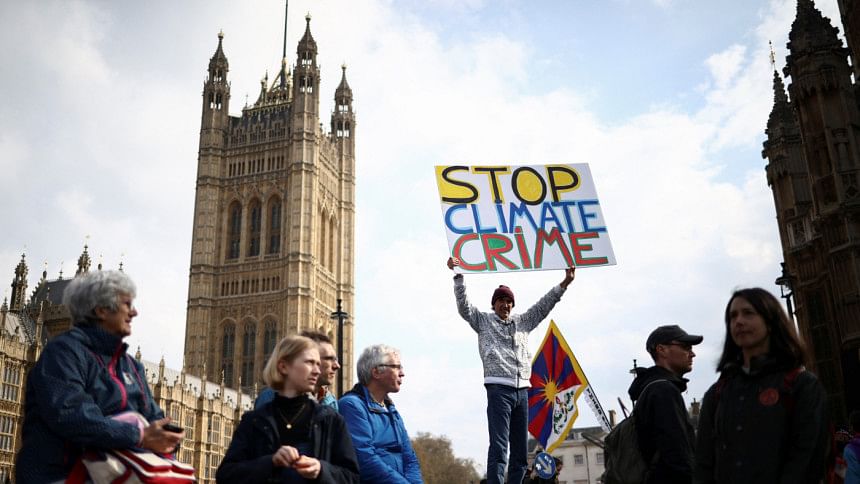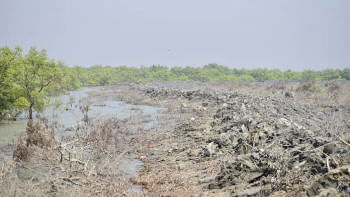Earth: Our only home, our responsibility

The fragile beauty of Earth is a poetic reminder of the intricate balance that sustains all life on our planet. From the expansive oceans to the verdant forests and majestic mountains, every facet of our natural world contributes harmoniously to the symphony of existence. The intricate ecosystems brimming with a diverse array of flora and fauna underscore the resilience and interconnectedness of all living organisms.
However, the swift pace of human activities, which are causing deforestation, pollution, and climate change, poses a severe threat to Earth's delicate beauty. It is crucial for us to acknowledge that our actions have profound consequences on this planet, and to assume responsibility for preserving and safeguarding this irreplaceable home for future generations.
Environmental conservation transcends mere moral obligation; it is an essential prerequisite for the survival of our planet and its inhabitants. The well-being of humanity is directly linked to the health of our ecosystems, encompassing clean air, water, and fertile soil for agriculture. Through the preservation of biodiversity and protection of natural habitats, we ensure that the delicate balance within our ecosystem remains undisturbed, enhancing resilience against environmental perils such as climate change.
Moreover, environmental conservation plays a pivotal role in securing the ability of future generations to flourish on Earth. By taking proactive measures to curb pollution, conserve resources, and mitigate habitat destruction now, we are investing in a sustainable future for all life forms on this planet. Each individual endeavour towards environmental conservation contributes significantly towards fostering a more symbiotic relationship between humankind and the natural world—one that prioritises reverence for the environment and ensures enduring prosperity for all living entities.
Amid mounting evidence showcasing the undeniable impacts of climate change, we must acknowledge the urgency surrounding this global crisis. Rising sea levels, extreme weather phenomena, and ecological shifts are no longer distant anticipations but tangible realities confronting us today. The accelerated pace at which environmental degradation is unfolding necessitates immediate action from individuals, communities, and nations alike.
Of particular concern are the ramifications of climate change on biodiversity. Species worldwide face extinction as their habitats vanish or become inhospitable due to fluctuating temperatures and environmental circumstances. Moreover, the issue of climate change is exacerbating prevalent social disparities by disproportionately affecting marginalised communities that lack the means to adapt or recover from environmental crises. With rising temperatures and an increase in natural disasters, vulnerable populations face heightened risks to their health, livelihoods, and overall welfare. A comprehensive approach to addressing climate change is imperative, one that places equity and justice at the forefront. Preserving biodiversity and the health of ecosystems is not merely an environmental concern but a critical matter for human survival. Each species within an ecosystem plays a vital role in maintaining its equilibrium, and the loss of even one can trigger ripple effects throughout the entire system.
By safeguarding biodiversity, we are also ensuring our own well-being, as diverse ecosystems provide essential resources such as clean air, water, food, and medicine. Additionally, protecting ecosystems is crucial for combating climate change. Healthy forests act as carbon sinks by absorbing significant amounts of CO2 from the atmosphere and helping regulate global temperatures. Safeguarding these natural habitats is essential for addressing climate change and securing a sustainable future for the upcoming generations.
Sustainable living practices are key to securing a flourishing future for our planet. From reducing waste and embracing renewable energy sources to supporting local businesses and promoting ethical consumption practices, each small step we take can have a substantial impact on the environment. By making mindful choices in our daily lives, we can contribute to a more sustainable and harmonious world for upcoming generations.
The adoption of minimalism is another pivotal aspect of sustainable living that often goes unnoticed. Instead of constantly pursuing material possessions and consumerism, embracing a minimalist lifestyle helps decrease our carbon footprint and shift our focus towards experiences over material goods. By simplifying our lives and reducing excess clutter, we not only benefit the environment but also enhance our overall well-being in the process.
Dissemination of information and the education of others on environmental concerns can also serve as a catalyst for collective efforts towards a more sustainable future. Simple gestures such as engaging in community clean-up initiatives or backing local conservation projects have the potential to trigger a cascade of positive outcomes. Ultimately, it falls upon each individual to acknowledge his or her role in shaping the planet's well-being and to strive towards a harmonious coexistence with the natural world.
Government policies and global initiatives hold significant sway in determining the course of our planet's future. International agreements on climate change, like the Paris Agreement, and sustainability targets set by various nations are pivotal in addressing environmental issues on a global scale. It is heartening to witness governments uniting to combat challenges such as deforestation, pollution, and resource depletion through collaborative endeavours and shared commitments. Nonetheless, there remains substantial work ahead in terms of effectively implementing and enforcing these policies. Without robust enforcement mechanisms and accountability measures, many initiatives risk falling short of their intended impact.
Our obligation to safeguard our habitat culminates in recognising that the destiny of Earth lies within our grasp. Each person has a responsibility to safeguard and nurture this planet for generations to come. By curbing our ecological footprint and advocating for sustainable methods, we collectively hold the power to instigate change. Moreover, acknowledging the interdependence among all living creatures underscores the urgency for immediate action. By understanding that every decision we make impacts not only ourselves but also the intricate balance of nature, we can start fostering a sense of duty towards this beautiful planet.
Md Ziaul Haque is assistant professor at the Department of English of the University of Creative Technology Chittagong.
Views expressed in this article are the author's own.
Follow The Daily Star Opinion on Facebook for the latest opinions, commentaries and analyses by experts and professionals. To contribute your article or letter to The Daily Star Opinion, see our guidelines for submission.

 For all latest news, follow The Daily Star's Google News channel.
For all latest news, follow The Daily Star's Google News channel. 











Comments